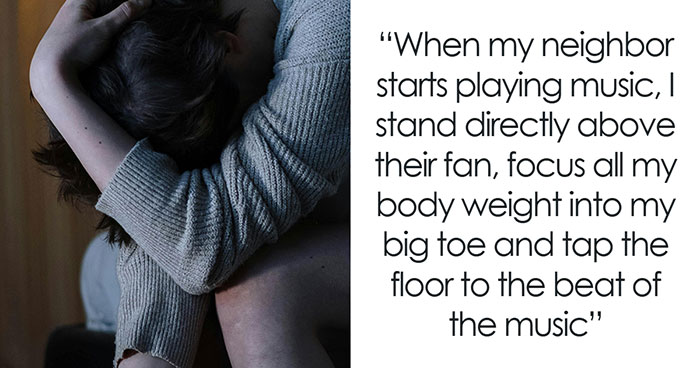Look at us, equipped with all sorts of tablets, laptops, mobile phones, and other high-tech equipment, yet we still lean on the good ol’ reliable pen and paper. Much like classic novels, Moleskine notebooks, and .5 G2 pens, journaling is another timeless thing that is here to stay. This might be because the many scientifically proven benefits of journaling overwhelm the inconvenience of not always having a notebook and pencil on hand.
Yet, the main problem holding people back from keeping a journal is what to journal about. Often, individuals keep a journal for those chance “brain blink” moments to note a random idea that popped into their heads. However, that’s just one of the purposes of journaling. Journaling ideas are literally as vast as the ocean. Anything you can think of can be noted down on paper. And although creative journal ideas can be found literally within your current sight (even with your eyes closed), the hard part is dissembling those thoughts and then piecing them back together. But that’s what we are here for—we do the hard part, you keep the fruits. So if you’ve ever thought of keeping a journal but kept backing off because you lacked things to journal about, fear no more—we’ve got you covered for a good while.
Below, we’ve compiled a list of fun journal ideas and random journal entry ideas to write about to keep your thoughts documented in black and white. Or whatever color pen you plan on using. Did you like any of the below ideas for journaling? Let us know by giving them an upvote. Also, any other cool journaling ideas we should have mentioned? Share them in the comments. Also, let us know whether you keep a journal or are planning on starting one!
This post may include affiliate links.
 Write a letter to someone.
Write a letter to someone.
In your diary, you can write a letter to someone you want to get back in touch with, share your affection with, or have a disagreement with. Then, you can copy and paste it into a real message, type it out by hand, mail it, or keep it to yourself. Don't forget that the recipient of the letter can also be you.
Write in “stream of consciousness.”
The journaling style known as “stream of consciousness” involves writing down your thoughts, ideas, and experiences as they occur to you, without any sort of organization or structure. You just write down your ideas exactly as they sound in your mind.
This is how I've always written in journals, but because I've always just used journaling to deal with intrusive negative thoughts, the entries are always really dark and depressing and I don't want to sully a pretty journal with that
 Write about how you’ve grown this year or what has changed.
Write about how you’ve grown this year or what has changed.
What exactly about this last year has changed for you, and to what extent? Focus on your internal changes and personal advancement rather than the circumstances and changes everyone else is going through.
Write about the top three priorities in your life right now.
As long as you list your top three priorities, you can be as vague or precise as you wish. Then consider how (and whether) you give them daily priority. What routines help you maintain your priorities, and which ones hinder you?
I'm not even sure what my top three priorities are, so I love this idea. It will help to get me thinking and figuring them out.
 Start a commonplace book.
Start a commonplace book.
A commonplace book is a sort of notebook that has been around since the Renaissance. It is a compilation of quotes, passages, observations, and other material compiled from numerous sources and put into one book to give the writer a personal resource where they may look back on the concepts, ideas, and inspiration they’ve accumulated through the years.
I've kept commonplace book for almost two decades, but didn't know it's having such a cool name 'till today. :D You never stop learning....
 Keep a dream journal.
Keep a dream journal.
Dream journals can include any observations on the dream’s importance or meaning, as well as the thoughts, feelings, and visuals experienced throughout the dream. Keeping a dream journal may also help examine your inner self and subconscious mind.
 Create an entry about a person you've been thinking about recently.
Create an entry about a person you've been thinking about recently.
Write about someone on your mind for whatever reason, such as someone you miss, who upset you, or even someone you'd like to get to know better. You may write about why this person is on your mind or create a screenplay for a hypothetical encounter with them and what you would like to tell them.
Write about something that scares you, yet you must do it anyway.
The famous line attributed to Eleanor Roosevelt states, “Do one thing every day that scares you.” Suppose you've ever caught yourself saying, "I hate driving at night," "I'm awful at small talk," or "I'm worried about what people will say." In that case, you already know why you avoid certain things and activities. Write about whatever comes to mind, and then construct some empowering self-talk to get you through anything that (you believe) isn't in your natural element and hinders your progress.
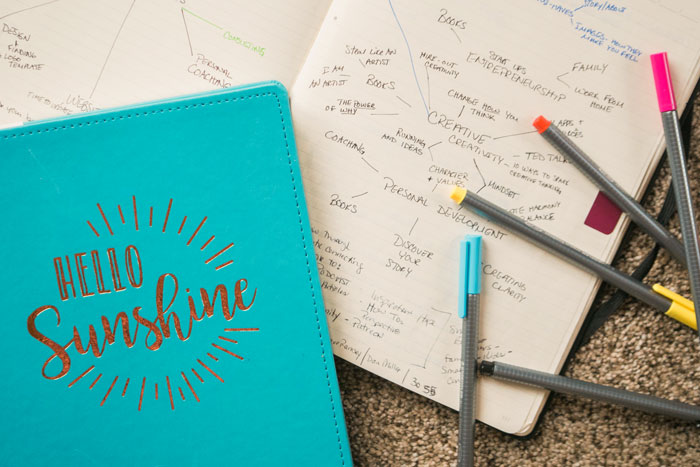 Create a mind map.
Create a mind map.
A mind map is a graphic representation of concepts and data frequently set up in a branching, non-linear fashion. Making a mind map can assist you in coming up with new ideas, connecting seemingly unrelated concepts, and getting a broader perspective on your thoughts and emotions.
 Journal about your vision for the future.
Journal about your vision for the future.
Where do you envision yourself in three years? Once again, concentrate on the key components of that vision. Although it's OK not to know where you'll live or which chocolate bar will be your favorite, what is this vision's broader context?
 Write about what you would do if a genie granted you three wishes.
Write about what you would do if a genie granted you three wishes.
Imagine you purchased an old oil lamp from an antique shop, and after rubbing it a bit with your polishing rag, a genie appeared and granted you three wishes. What would you do with them?
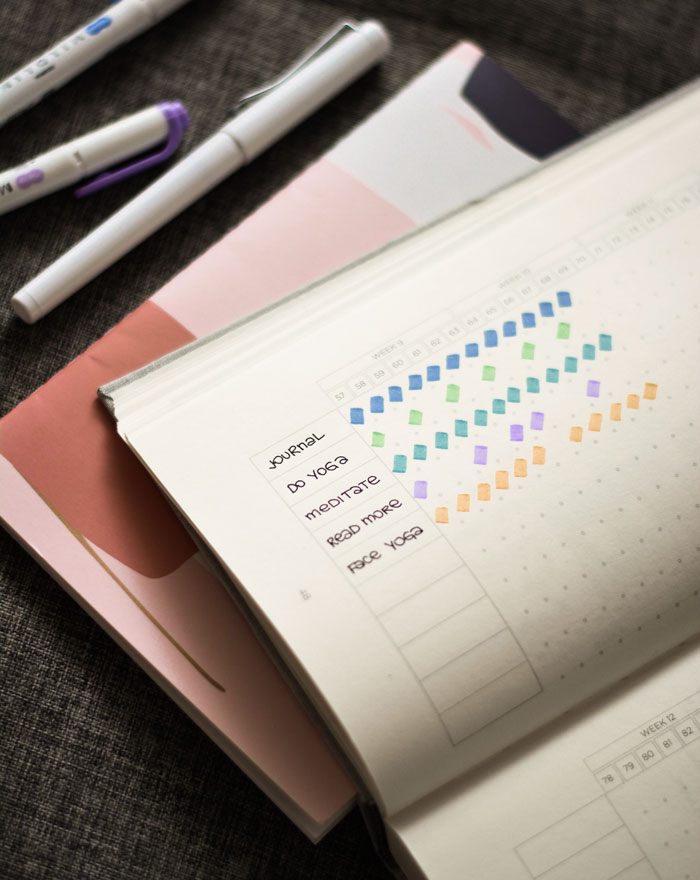 Track your habits.
Track your habits.
Because it enables you to keep a record of your progress, reflect on your experiences, and make modifications as necessary, journaling may be a powerful tool for tracking habits.
Create an “I forgive…” journal entry.
This likely makes you think of someone you find hard to forgive. But even if you're not over it, put down, "I forgive [name], and I desire only what's good for him/her." Not for them, but for you, so you can finally move on.
Answer the question, “What would I love?”
This is a good one to have fun with. Still, you must be mindful not to ask yourself, "What's the point of even trying to write this since my circumstances are unlikely to make it possible?" Chill, trust the law of attraction!
Describe a challenge you’re currently facing or one you’ve recently overcome.
What obstacles have you overcome in your career, relationships, or personal growth? What accomplishments have you made? What impediments still hinder your progress and hold you back? Identify them.
Write your vision for this day and your intentions.
How will you wish to have spent this day after it is all over? Or on what three things, in particular, do you want to concentrate today? How will this day help you achieve your long-term goals?
 Write a “note to self.”
Write a “note to self.”
A morning note to self is a reminder for oneself to do something meaningful that day. For example, you may write a message about something you want to remember from today, perhaps strive to learn something new about yourself or note something you want to change by the time the night comes.
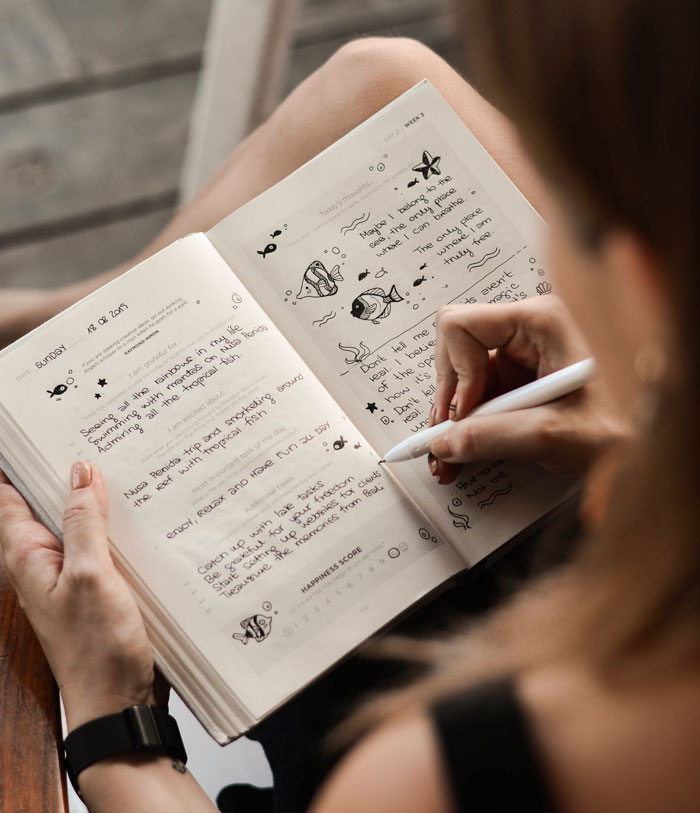 A creative character sketch.
A creative character sketch.
Create a character based on you or someone you know in a creative diary post. Or build an entirely fictitious character with particular quirks or a dreadful secret! This diary entry might serve as the idea for a future book or short fiction. Who knows?
Write about something absurd.
Start with an absurd observation, such as "the sky is the perfect hue of a cinnamon roll glaze," or something even more outlandish and see where it goes. It might lead you somewhere. Also, it might not. Creativity and absurdity know no boundaries.
 Express how your day is going.
Express how your day is going.
Write about how your day (or your day thus far) has gone, what has happened, and what you are grateful for.
 Describe the kind of person you want to be.
Describe the kind of person you want to be.
Focus on your ultimate objectives and the person you must become to achieve them. Imagine yourself as this individual and explain your way of life and your daily activities. Write about the traits you value in others and the ones you would like to have.
Write about compliments you received that impacted your life.
Some compliments have a more significant impact than others. You may recall compliments you've gotten that caught you off guard and altered how you see yourself. Describe one of these compliments, including the person who gave it to you.
 Write about what you’re feeling at this very moment.
Write about what you’re feeling at this very moment.
List all the feelings that come to mind, noting which ones are the strongest. Then delve a bit more to discover the grounds behind your feelings.
If you live with anxiety, write about how you cope.
Do you currently feel nervous about anything? What coping mechanisms have you built to help you manage your anxiety or unexpected stressors and triggers? Describe a situation when you applied one of those approaches and how effective it was.
 Write about something that makes it hard for you to fall asleep.
Write about something that makes it hard for you to fall asleep.
Why do you think you had difficulty putting those thoughts to rest? What was going through your mind? Do you fear that you will be bothered by these thoughts again tonight? What can you do to improve your chances of sleeping soundly?
Write about the thing you learned from someone who hurt you.
You don't have to mention any names. Just write about a painful situation that person made you undergo and what you took away from it. Have you altered how you react in similar circumstances? Have you changed how you feel about them? Were you able to forgive them?
Write about an exercise you want to start doing daily.
Since hearing that famous "sitting is the new smoking" phrase (and probably before that), you might have considered including more exercise in your everyday life. What can you begin doing now or this week that you can sustain?
 Write about a birthday memory that still makes you smile.
Write about a birthday memory that still makes you smile.
Maybe the first thing you noticed when you opened your eyes in the morning was a thoughtful, handcrafted surprise waiting for you on a dresser. Or your favorite breakfast was ready when you got downstairs. Describe anything you can remember in as much sensory detail as you can.
 Track your moods.
Track your moods.
A mood journal is a diary where you track your emotions by consistently observing and documenting your emotional state. To understand what causes your mood shifts and how to manage them, you may find it helpful to detect patterns in your emotions via this form of writing.
 Make a list.
Make a list.
You can start off by making a list of anything, really. For example, the things you like to do each morning, new things you'd like to try in life, things you wish you had known sooner, or simply stuff you see in front of you.
Make a list of affirmations.
Positive affirmations help break negative thought patterns and create a new pathway for happy thoughts in your brain. Affirmations could be about anything important to you, including your personal growth, work, finances, and relationships.
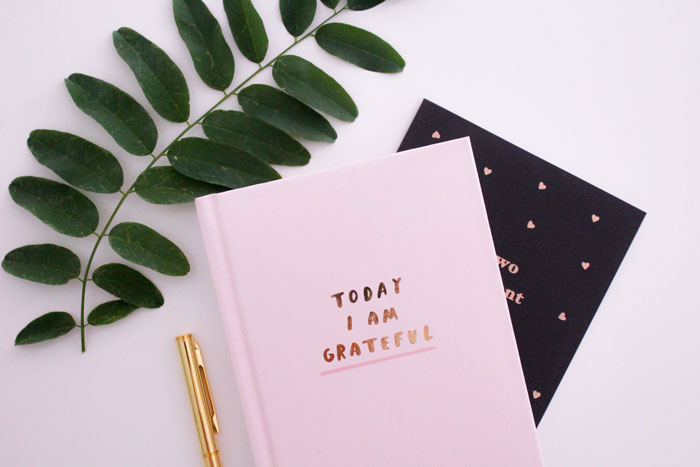 List what you’re grateful for.
List what you’re grateful for.
Start by listing one thing for which you are thankful, then keep adding more. Pretty soon, you’ll have a mood-boosting gratitude list you will find incredibly uplifting, especially on days you feel like nothing is going your way.
 Compliment yourself.
Compliment yourself.
Presume that you have been asked to write a compliment for someone, but that someone is actually you. This is a unique approach to cultivating self-love.
 Write down your morning routine.
Write down your morning routine.
You must follow certain morning rituals, even if you don't always do everything exactly the same way. What new habits would you like to include in your morning routine to improve how your day starts?
Journal about a milestone you’ve reached or one you’re working toward.
Pick an achievement that has helped you get closer to your personal objectives. Are you there yet? If not, how far away are you from achieving it, and what must you do each day to progress?
 Describe your perfect day.
Describe your perfect day.
Write a detailed account of the whole day in your journal, from getting up in the morning to going to bed that night. Also, underline the specific things that made the day perfect. Could you implement them more often?
 Write about the food you’ve eaten and what you will eat today.
Write about the food you’ve eaten and what you will eat today.
Try incorporating sensory descriptions in your journal to encourage yourself to continue practicing mindfulness even when eating. Whether you're beginning a new diet or not, it can be beneficial to maintain a thorough record of everything you've eaten and planned to consume in the coming hours.
Write a letter to someone who has passed.
Although it's not the same as telling that person what you wanted to say, putting it down in a notebook can offer some closure if you never got the chance to do so.
Write about a recent or distant memory.
Write in your diary about a memory that has popped into your mind, maybe due to a recent life event that reminded you of it. Whether or not it's pleasant, you could relish writing about it. Also, try to recollect as many sensory details as you can.
Describe what you’d do with 10% of your earnings if you had them ready in cash.
What would you buy and why if you were to withdraw 10% of one of your paychecks in cash for your own personal use? Describe how you would feel if you did this and how you would spend the money.
 Prepare compliments for special people in your life.
Prepare compliments for special people in your life.
Imagine you are getting ready for a session where you and special people in your life take turns sitting in a "chair of compliments" and compliment each other on various aspects about one another.
 Journal about the bad habits you’d like to change.
Journal about the bad habits you’d like to change.
What ingrained behaviors have you developed that are not beneficial to you? And what new behaviors would you wish to adopt in their place?
Write about someone you haven’t talked to in years.
When did you last speak with them? Do you have any idea how to contact them? Would you like to? If not, why not? Also, why do you think they have disappeared from your life?
Write about your fear and how you respond to it.
Have you ever noticed your thoughts returning to a past or present fear? Which response have you made in light of that fear? Is there a way that it's stopping you from progressing? How are you going to get over it?
 Write about new financial habits you want to build.
Write about new financial habits you want to build.
You might wish to start setting aside some money from each payroll. Or begin paying off your smallest debts (because those can be paid off much quicker). Write down your thoughts and the steps you plan on taking with whatever financial concern is at the top of your list and head.
Write about three influential non-relatives in your life.
Think of your teachers, personal trainers, therapists, managers, co-workers, or housemates—anybody who positively influenced your life. Write about how you met and what they said or did that influenced your choices or changed how you looked at something.
 Document your trips.
Document your trips.
You can keep a journal just for your trip experiences and insights. While time might seem more precious and fleeting while traveling, it is common to experience the desire to document what has transpired, not just on the camera but also on paper.
Start a manifestation journal.
By keeping a manifestation notebook, you may track your progress toward your objectives and focus your thoughts and energies on what you want to materialize in your life.
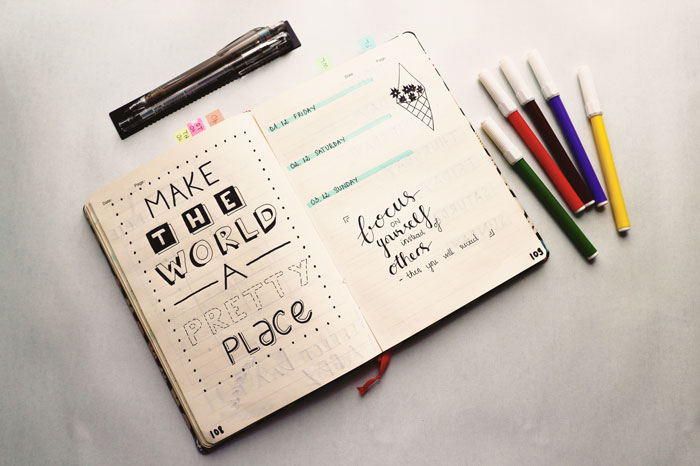 Make a list of meaningful quotes.
Make a list of meaningful quotes.
Whether it's GoodReads, BrainyQuotes, or the many quote posts we share on Bored Panda, pick the ones that resonate with you the most and write them down. Perhaps there's a quote you disagree with—write it down and explain why you feel so.
 Write about an important past or future event.
Write about an important past or future event.
Write about any experience that brings up memories, whether they are pleasant or not. Or write about a future event that is important to you. Why is it so important?
 Write about a dream you remember vividly.
Write about a dream you remember vividly.
Some dreams linger in your mind for much longer. What dream stuck with you the longest, and why do you think it still lives in your memory? Do you wish to recreate any aspects of the dream in the real world? Alternatively, could the dream allude to a worry or anxiety you must confront in real life? Also, you might want to check out our post about common dreams and their meanings!
Write about forgiveness's power and its role in your life.
There's a lot to ponder: when did you last receive forgiveness? How has that altered your life? How did it impact other relationships and your friendship with this person? How has it affected your feelings for both this person and yourself?
Write about a moment you had in the spotlight as a child.
Perhaps your family or friends praised your talent after participating in a school play, concert, or recital. Write down whatever comes to mind, including all the details you can recall.
Write a letter to your future self.
Write a letter to or from your future self. Both letters can be read and reflected on in the future and can help you keep track of life lessons learned or consider how you’ve changed over time.
 Focus on the positive.
Focus on the positive.
This journaling approach invites you to list and consider the positive aspects of your life. Positive journaling can enhance your general well-being and happiness by helping you change your perspective and focus on the good things in life.
 Answer, “What can't I stop thinking about?”
Answer, “What can't I stop thinking about?”
This can be very liberating. Give yourself permission to express such thoughts in the open, even if it's just on a sheet of paper.
Write good things about someone you’re on bad terms with.
Although it's easier to express your anger, consider saying only positive words about the target of your wrath. This can only benefit you—you may forgive people more easily the more benevolence you show toward them on a sheet of paper.
Write about questions you have regarding religion or universal beliefs.
What questions do you have concerning religion, the afterlife, or a higher power? What do you wish to learn about the cosmos, your place in it, and your relationship to it? How would you respond if someone challenged your beliefs?
 Write about a habit you can work towards this week.
Write about a habit you can work towards this week.
You might be interested in starting meditating. Or you can switch to tea instead of two cups of coffee to avoid getting the jitters. Describe any changes you'd like to make and explain how they could improve your life.
 Jumpstart your creative writing.
Jumpstart your creative writing.
In your journal, you can experiment with creative written works like short tales, poetry, song lyrics, memoirs, or novels. Some people find it beneficial to have a notebook where they may jot down ideas and thoughts that might later serve as inspiration for new writing efforts.
 Write something someone said or did that made your day.
Write something someone said or did that made your day.
Consider an instance when someone did or said something that made you gleam with happiness and gratitude. What was that thing, and what about its circumstances made you more inclined to smile when you thought about it?
Write your solution to a particular problem or challenge.
You most likely have solutions to particular issues or know how to overcome a specific obstacle. Perhaps you had to learn it the hard way, as most of us do. Writing in your notebook about it may evolve into a beneficial blog post or even a book. A best-seller, maybe?
 Write about something you’ve recently read.
Write about something you’ve recently read.
Write about what stood out to you recently and why it still matters, whether you're thinking about a memorable excerpt from a book, a blog post or article you recently read, or a magazine headline.
 Begin a journal entry with a prayer.
Begin a journal entry with a prayer.
Your daily journal is a perfect space to express yourself fully. Writing about your issues increases the likelihood that you'll find the solutions, blessings, and successes you're looking for, whether you have problems that need to be resolved or need assistance with any of them.
 Use a painting or a picture to inspire your writing.
Use a painting or a picture to inspire your writing.
Write about the time you saw a photo in a magazine or on the internet that drew your attention and transported your mind elsewhere or the time you purchased an art piece that inspired you to envision a life that could one day be your own.
Use a timer.
After setting the timer for 10 to 30 minutes, just write whatever comes to mind. If a lot of what you're writing seems silly or weird, you're on the right track. Thoughts are messy, and every mind needs decluttering.
Just a single sentence.
Compose a single sentence. Then another. You may stop then, or you can keep going. One of those sentences may ignite something. But even if they don’t, you’ve written two sentences, and that’s something.
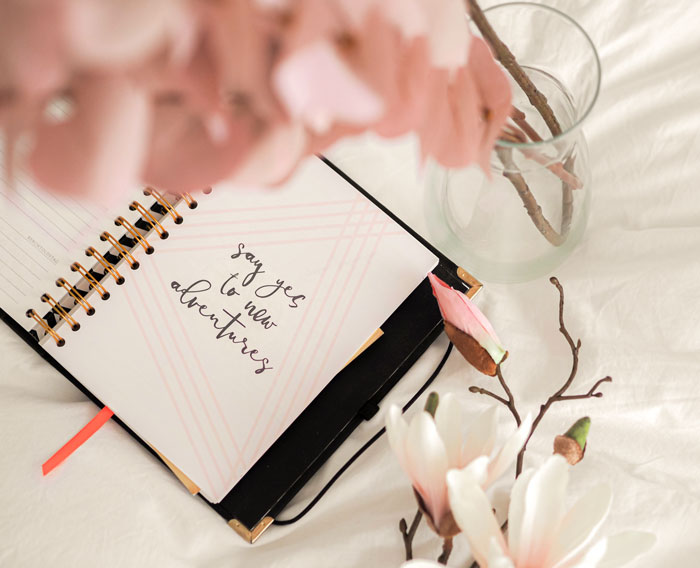 Write an encouraging personal note to yourself.
Write an encouraging personal note to yourself.
Write an encouraging letter to yourself about the day you'll have or a difficulty you'll be confronting today, just as you would in a diary. Write the words you would like to hear from a friend. But the friend is you.
 Start with your favorite meal.
Start with your favorite meal.
Write about the ingredients and preparation of your favorite dish. Whether you enjoyed this meal by yourself or with someone, describe your best experience. How come it's your favorite meal?
Write an internal dialogue by dictation.
Bring two of your "selves" together for an open discussion. Consider your past and current selves, your wounded self and your caring, compassionate caretaker self, or your tempted self and your powerful self. Take notes for the voices in your thoughts.
Describe something you can’t imagine your life without.
Narrow down to the essentials you'd want to have with you at all costs if you lost everything else, whether that be a specific lotion, a particular kind of coffee, or your favorite pair of jeans. How did you come across these items, and why do you think they're such an important part of your life?
Write about the apps helping you function as an adult.
To start, make a quick list of the applications you use the most. Then, write about one or more of your favorite apps and how they make your life easier. Why are they superior to any similar ones you've tried? How have they affected your life, if at all?
 Try digital journaling.
Try digital journaling.
Digital journaling offers a new approach to documenting your thoughts, feelings, and experiences. The act of journaling doesn’t change, but the format does: instead of using a physical notebook, you can write down or voice record your ideas on a phone, computer, or tablet. And you can employ emojis!
 Brainstorm.
Brainstorm.
A brainstorming session should aim to produce as many ideas as possible without evaluating or rejecting any of them. It should be enjoyable and open-ended. This might be useful if you’re working on a personal, sensitive project or trying to flesh out an idea before you share it with others.

 Dark Mode
Dark Mode 

 No fees, cancel anytime
No fees, cancel anytime 





















































